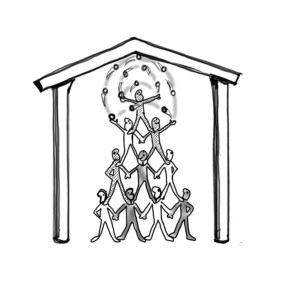Thanks to Google Alerts, I discovered a great review of Engaging Emergence by Ron Lubensky, from the Centre for Citizenship and Public Policy in Sydney, Australia.
An excerpt:
This is the sort of easy-to-read book that you want to leave lying around so others will find it accidentally. Maybe they’ll recognise, as Peggy hopes, that modern life is not a predictable, steady state that is occasionally and annoyingly disrupted. Rather, life should be celebrated as an evolution of surprises, change and adaptation. Peggy provides us with a straightforward roadmap about how to constructively steward positive change.
In the last paragraph, Ron raised an issue about power (bolding is mine):
Engaging emergence requires that we talk to one another in a civil manner with mutual commitment. Perhaps wisely she has sidestepped the thorny challenge of motivating people who exercise power to graciously and generously devolve their authority to a shared enterprise. The book presumes that a situation where the practice can be exercised poses no political barriers to emergent change. Unfortunately, this would be a rare occurrence. So just like the enterprise of deliberative democracy, which requires the practice of engaging emergence, the initial challenge is just getting to step 1.

Since the challenge Ron raises is no doubt a common one, thought I’d share my exchange with him:
Thanks for your reflections on Engaging Emergence. I’m delighted at your enthusiastic response!
And I want to comment on the challenge you raised of motivating people with power. There are virtually always political barriers! Shame on me that I wasn’t more explicit on how to address them.
What I have found to be true is that when the issue faced is more important than their position, people in power positions will engage. In other words, they’ll step up when:
- the situation reaches the point that they realize that they can’t solve it alone;
- it is critical to their success; and
- they’ve found a partner to work with that they’re willing to trust.
Essentially, these are the conditions when anyone will engage. It’s just that people with more to lose tend to wait longer. By then, the situation is really messy and they’re desperate.
I’ve experienced this shift in government agencies, like the National Institute of Corrections (NIC), and in organizations, like the Boeing Company. As Chris Innes of NIC put it so eloquently, they stepped up to “make it up as they went along” when doing the same old thing was not worth the trouble.
Posted by Peggy Holman 05 October 2010 06:47 am | link
********************
Peggy, thanks for your elaboration regarding motivations to stepping up. It also points our community of practice to work harder to generate opportunities using the non-instrumental language you recommend. ps, I’ve posted sections of my review to Amazon for you! Best of success!
Posted by Ron Lubensky 05 October 2010 10:18 am | link


[…] This post was mentioned on Twitter by Curtis Ogden, PeggyHolman. PeggyHolman said: Power can be a challenge when dealing with change! A few thoughts on the subject when #engagingemergence: http://bit.ly/cpuAGm […]
Thank you for this excellent and timely post. The question of power is very much up in our work at IISC as relates to various dimensions of difference. When we teach and preach and practice collaboration, there are often naysayers who push back and say that the powerbrokers will have none of it. As you say, when it feels like you have something to lose, it’s no surprise. So it is incumbent upon the would-be change agents among us to make the case and create the conditions for everyone (especially those with power and influence) where it is glaringly apparent that going solo will not fly and that they can trust the partners and the process to add value and perhaps make their work easier.
[…] a recent post of her own, Peggy highlights an interesting comment that appeared in a review of her newest work. Ron […]
[…] Email list ← The Challenge of Power […]